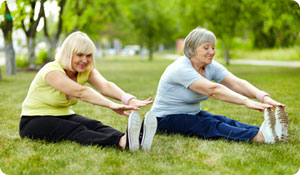
Nobody knows exactly what causes a muscle spasm or a "charley horse." We don't even know how it got the name, but everyone recognizes it when they get one. Here's the low-down on what to do when a muscle spasm comes to you.
It's a muscle contraction that comes on suddenly, tightening muscle fibers to the point of extreme pain. They occur most often in the feet and legs, but can occur in any muscle group. They often happen at night or while someone is drifting off to sleep, but can also occur during exercise or for no apparent reason at all. The pain can last for a few moments or a few minutes and might leave the muscle tender and achy for days.
What Causes Muscle Spasms?
While there are no studies that prove exactly what causes them, there are plenty of theories:
The National Institutes of Health (NIH) says, "Muscle spasms often occur when a muscle is overused or injured. Working out when you haven't had enough fluids (you're dehydrated) or when you have low levels of minerals such as potassium or calcium can also make you more likely to have muscle spasms. Some spasms occur because the nerve that connects to a muscle is irritated."
What Should You Do If You Get a Muscle Spasm?
As soon as you feel the spasm begin, stretch the affected muscle. For example, if the cramp happens in your calf, stretch those muscles by pointing your toe upward. This lengthens the muscle fibers and should stop the muscle from contracting too tightly. Then, massage the affected muscle and apply heat to encourage it to relax. If pain persists, try an over-the-counter pain medication like ibuprofen or Tylenol®.
How Can You Prevent Muscle Spasms?
- Stay hydrated. Nerves and muscles work best when they get plenty of water. Make sure you drink plenty of water during the day and extra when you're exercising.
- Stay nourished. There are many vitamins and minerals involved in helping muscles contract smoothly and efficiently. The best sources of nutrients come in fresh fruits, veggies, whole grains, legumes, and nuts. If you aren't eating as well as you should, consider taking a multivitamin that includes potassium, magnesium, calcium, B vitamins, vitamin C, and more. Ask your doctor for recommendations.
- Stretch after exercise. Focus on the muscles used during your workout session, but don't neglect the others. Muscle cramps can occur in any muscle.
- Sleep in a cool room. Some people find that being overheated increases the frequency and severity of charley horses. Dial down the thermostat and kick off the covers.
Having an occasional muscle spasm won't damage your health, but talk to your doctor if you have them regularly. It might be that some of your medications (specifically heart and blood pressure drugs) are causing them or you may have an underlying health problem.
Sources:
National Institutes of Health/Medline Plus
Charley Horses
http://www.nlm.nih.gov/medlineplus/ency/article/002066.htm





